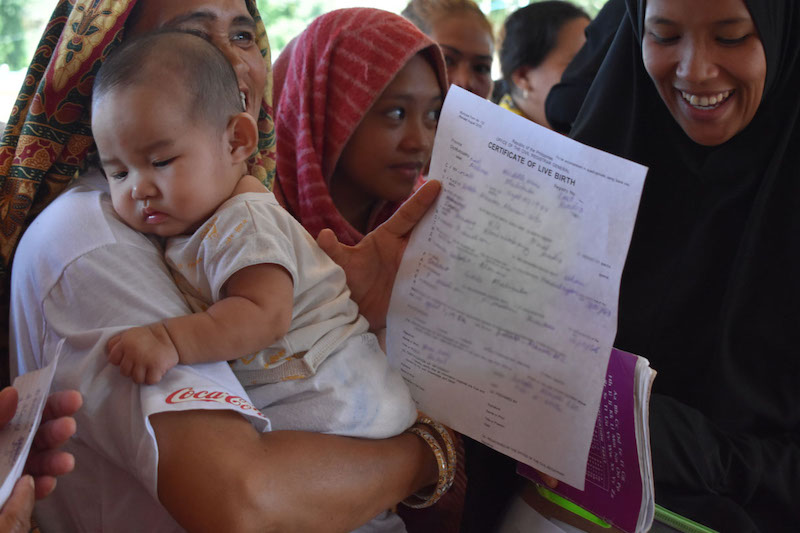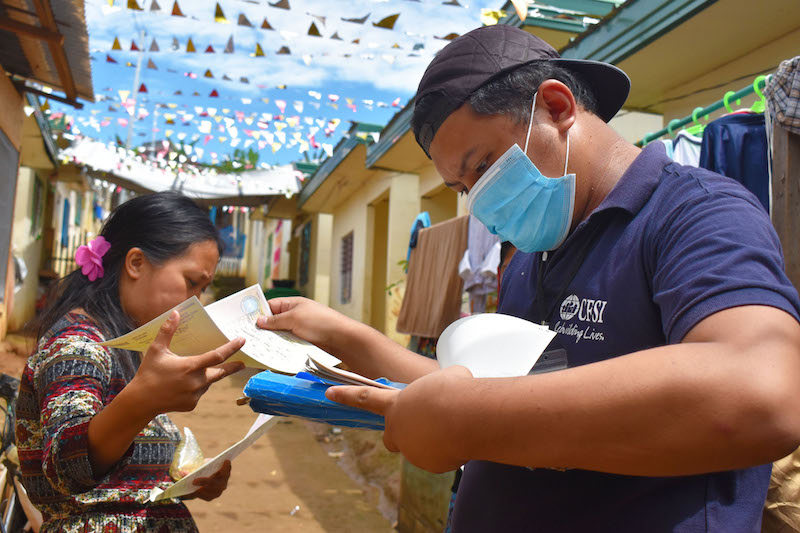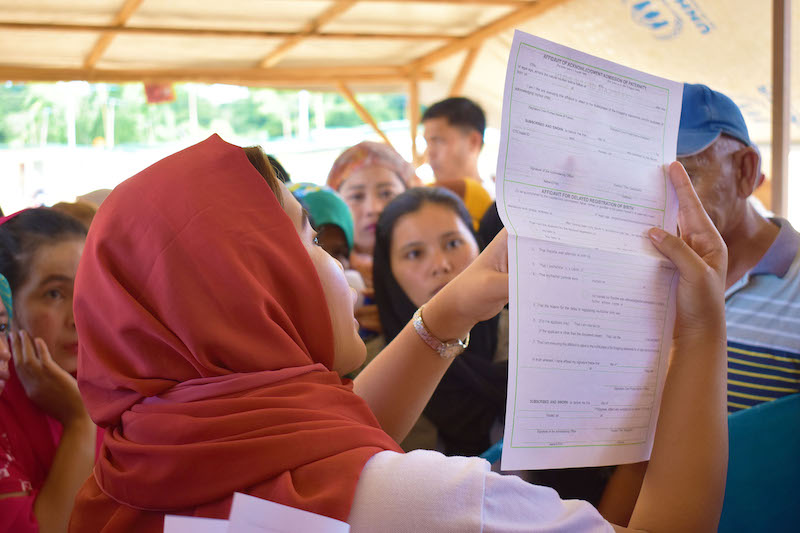The story was originally published by MindaNews, the news service arm of the Mindanao Institute of Journalism.
MARAWI CITY (MindaNews / 22 March) – Nobody knew that Mohmina Ontiling is 105 years old — or that she exists at all. Her name wasn’t on any official civil registry, until her existence was endorsed by a humanitarian organization that mounted campaigns to register people who fled their homes in the wake of the May 2017 Marawi Siege.
Ontiling received her Certificate of Live Birth (COLB) from Marawi’s Local Civil Registrar’s Office (LCRO) on January 30, 2019.

REGISTERED at 105 years old. Birth registration is beneficial even to the elderly. Civil registration papers allow them to acquire senior citizen IDs for discounts on certain goods and services and social pensions for indigents. Being registered is the first step for Mohmina Ontiling, 105 years old, to become eligible to receive such privileges.
“Maraming Maranaws na di pa naka-register sa Local Civil Registry dahil hindi pa sila well-informed sa importansya o benepisyo ng birth certificate sa kanilang buhay” (There are many Mernanaws who have not registered at the Local Civil Registry because they are not well-informed about the importance or benefit of birth certificates in their lives), said Rawia Pangadapun, Local Civil Registrar of Marawi City.
Birth certificates are important as it is to authenticate one’s identity and nationality; to gain access to health care and social services; access to education; access to inherit property; prevent child exploitation; access to legal work; for driver’s license, passport, to open bank account, and register to vote, according to Pangadapun.
“As it was said, birth certificate is the mother of all documents,” she said.
Without proof of identity, people are “invisible to their governments,” and “could miss out on their rights being protected and upheld, as well as essential services like health care and education,” according to a report from the United Nations Children’s Fund (UNICEF).

Assisting the people of Lanao del Sur in the registration of birth.
Ontiling survived the Japanese occupation of Lanao during World War II in the 1940s, the wars between government forces and Moro liberation fronts, and the most recent, the Marawi Siege of 2017.
But she lost their home in Barangay Dagubduban, one of 24 villages in ‘Ground Zero,’ the main battle area between government forces and the Islamic State-inspired Maute Group and Abu Sayyaf in the 2017 siege, now referred to as the Most Affected Area (MAA).
Currently, she, and 11 of her children, and great grandchildren live in Rorogagus Transitory Shelter in Marawi City.
As of March this year, about 350 families are housed in the shelter.
Benefits
As of January 31, 2021, the humanitarian organization, Community and Family Services International (CFSI) through its Marawi Recovery Project (MRP) has endorsed 7,186 ‘bakwits’ or internally displaced persons (IDPs) who fled their homes in 2017 to their LCROs for birth registration.
About 5,782 of them have already received their COLBs. Among those who received their birth certificates is the 105-year old Babu.
Birth registration is beneficial even to the elderly. Civil registration papers allow them to acquire senior citizen IDs for discounts on certain goods and services and social pensions for indigents. Ontiling was able to receive both.
Ontiling’s family said they already applied for the centenarian cash gift, a program by the Department of Social Welfare and Development (DSWD) under Republic Act (RA) No. 10868 or the Centenarians Act of 2016. However, they have not heard of any updates on their application.
Ontiling’s age was determined based on how she was already alive during the Japanese occupation in Lanao del Sur. It was also by estimating the age of her eldest son who was supposed have already been around 75 years old, had he lived.
Her son also died without having been registered in the civil registry.
CFSI’s MRP, which started in 2017 after the liberation of the City, aims to promote protection, psychosocial, and economic recovery of at least 6,500 vulnerable households affected by the siege in Marawi and the municipalities of Ditsaan-Ramain, Marantao, Piagapo, Butig, Lumbayanague, and Masiu.

Distribution of security papers from the Philippine Statistics Authority for the internally displaced persons in Boganga Transitory Shelter in Marawi City amid the COVID-19 pandemic, on 15 October 2020.
With funding from the Australian Government Department of Foreign Affairs and Trade , the MRP has also endorsed 4,580 persons to the Philippine Statistics Office to receive security papers (SECPA).
Pangadapun said that the Local Civil Registrar’s (LCR) COLBs are local copies of a person’s birth certificate which are archived by the PSA. SECPA copies issued by PSA signifies that a birth registration is authentic.
School records
In Boganga Transitory Shelter, two of Jimmy Bantilan’s children who are in high school were also assisted for birth registration by the MRP and finally have official school records.
During the early days of the pandemic, his children, who was living away from them, had to move to a school in Marawi to keep the family close during the health crisis.
By submitting their children’s birth certificates, a requirement to enroll in school, they were able to get permanent Learner Reference Numbers (LRN) and have official school records.
Upon moving to a school close to their family, Bantilan was able to request for the transfer of learner’s school records.
“We received the birth certificates just in time for them to be able to transfer schools,” Bantilan said.
For Asma Badron, receiving her birth certificate on May 12, 2020, made it easy for her family to bring her to Gregorio T. Lluch Memorial Hospital in Iligan City to give birth that same day. Birth certificates are among the requirements for hospital admission.

Internally Displaced Persons in Boganga Transitory Shelter in Marawi were oriented on how to fill up dummy forms for the application of Certificate of Live Birth on August 14, 2019.
Aisah Salim, a mother of nine, fled from one place to another in order to survive the siege in 2017. When the war ended that same year, they decided to return to Marawi, hoping to receive relief and assistance from the government. However, because they lacked the required documents such as birth certificates, they could not be issued a Disaster Assistance Family Access Card (DAFAC) and were deemed ineligible to receive aid for IDPs.
When she received her family’s birth registration papers this year, Aisah became a beneficiary of the Pantawid Pamilyang Pilipino Program (4Ps), the national government’s poverty reduction strategy and human capital investment program that provides “conditional cash transfer to poor households to improve the health, nutrition, and education aspect of their lives.”
“My registration in 4Ps came just in time since our oil and eggs business declined because of the quarantine,” Salim said, adding that the aid from the program enabled her to buy her family needs for daily living.
“Patuloy ang birth registration dahil na educate ang mga tao sa kahalagahan o importansya ng [birth registration] at sa patuloy na kampanya ng aming LCR Office. Naging successful din ang kampanya sa birth registration sa pagtulong ng ibat ibang NGOs katulad ng CFSI na patuloy na sumusuporta sa Marawi City. Malaki ang nagampanan nila para sa pagpaparehistro ng birth certificates nga mga Meranaws,” Pangadapun said. #

